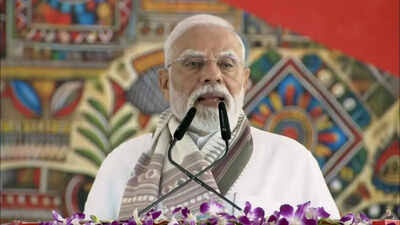
Central Government Accountability Measures Spark Political Debate
Prime Minister Narendra Modi has sparked a national conversation about governance accountability by defending a proposed constitutional amendment that grants the central government authority to remove ministers—including chief ministers and even the Prime Minister—while in detention. Speaking at a public rally in Gayaji, Bihar, Modi emphasized the disparity between the treatment of government officials and political leaders. He highlighted how ordinary government employees, such as drivers or clerks, are automatically suspended if detained for 50 hours, yet senior politicians can continue holding office despite similar circumstances. This contrast, Modi argued, undermines the principle of equal accountability under the law. His remarks come amid ongoing debates about the balance between political freedom and institutional integrity, with critics warning that the amendment could be weaponized against dissenting voices.
Legislative Proposals and Opposition Concerns
Union Home Minister Amit Shah recently introduced three key legislative proposals in the Lok Sabha, including the Constitution (One Hundred and Thirtieth Amendment) Bill, 2025. This bill empowers the central government to remove ministers facing corruption or serious charges if they remain in detention for 30 consecutive days. The Government of Union Territories (Amendment) Bill and the Jammu and Kashmir Reorganisation (Amendment) Bill also face scrutiny, with critics arguing they could enable politically motivated actions. Opposition leaders have raised alarms about the potential misuse of these laws, citing precedents where leaders signed official orders from jail, which they claim erode anti-corruption efforts. The government maintains that these measures are necessary to uphold democratic accountability, but the controversy has intensified calls for transparency in the legislative process.
Parliamentary Scrutiny and Institutional Checks
The contentious bills have prompted the government to refer the matter to a Joint Parliamentary Committee (JPC), which is tasked with submitting its findings by the end of the first week of the next parliamentary session. This move has drawn mixed reactions, with supporters praising the initiative to ensure legislative rigor and critics accusing the government of circumventing democratic oversight. The JPC’s report will be pivotal in determining whether the amendment passes, as it will need to address concerns about due process and potential abuse. Meanwhile, the debate has reignited discussions about the role of parliamentary committees in balancing accountability with political freedoms, leaving lawmakers and citizens divided on the implications of the proposed changes.
Broader Implications for Governance and Democracy
The controversy surrounding the amendment has broader implications for India’s governance model, raising questions about the limits of executive power and the protection of political rights. Advocates argue that the law is essential to prevent corruption and ensure that no leader is above the law, while opponents warn of the risks of political vendettas and the erosion of judicial independence. The case of ministers signing orders from detention has become a focal point, with some viewing it as a necessary check on corruption and others as a threat to democratic norms. As the parliamentary process unfolds, the outcome of this debate will shape the future of accountability mechanisms in Indian democracy, testing the nation’s commitment to both transparency and political freedom.




